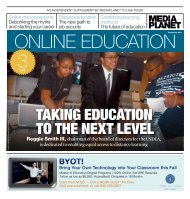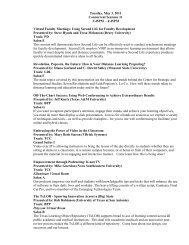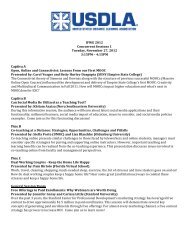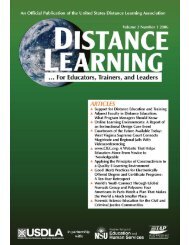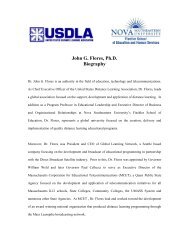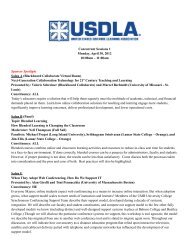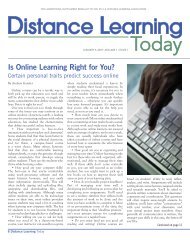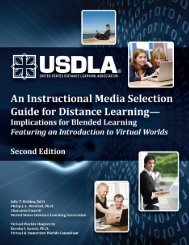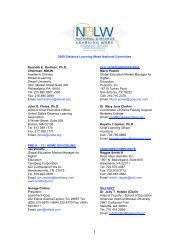United States Distance Learning Association
United States Distance Learning Association
United States Distance Learning Association
- No tags were found...
You also want an ePaper? Increase the reach of your titles
YUMPU automatically turns print PDFs into web optimized ePapers that Google loves.
ida Division of Continuing Education,<br />
2007):<br />
1. Web-based courses that provide information<br />
and instructional content<br />
online, usually in the form of interactive<br />
text, graphics, and various other<br />
types of online tools. Examples of<br />
these tools include course Web sites<br />
(such as provided by WebCT), streaming<br />
video, bulletin boards, online chat,<br />
student progress tracking, e-mail,<br />
course calendars, and student homepages.<br />
2. Video tape(s) using moving images<br />
and audio tends in a lecture-style<br />
presentation. Courses incorporating<br />
videotaped lectures usually are accomplished<br />
by mailing videotapes directly<br />
to a student, although UF also allows<br />
students to view VHS videotapes of<br />
instructor lectures at specific locations<br />
within the UF system.<br />
3. Video conferencing is a live, two-way<br />
dialogue with teacher and other students<br />
via a specially equipped conference<br />
room or on a computer.<br />
Interactive video conferencing courses<br />
allow the instructor and students to<br />
communicate with each other live<br />
through a two-way audio and video<br />
signal.<br />
4. CD-ROM or DVD-ROM technology<br />
often uses moving images and audio<br />
in a format that is easy for students to<br />
review. This format usually can be<br />
used without accessing the Internet.<br />
The materials on a CD-ROM or DVD-<br />
ROM could include prerecorded lectures,<br />
multimedia demonstrations,<br />
interactive assignments as well as lecture<br />
notes, and other types of computer<br />
files.<br />
5. Printed materials that provide for portable,<br />
inexpensive, accessible and wellorganized<br />
materials. Many courses<br />
that use other technologies also integrate<br />
printed materials, but those<br />
courses, which exclusively use print<br />
materials to convey course contents,<br />
are often referred to as “correspondence<br />
courses.” UF’s Office of Correspondence<br />
Studies specializes in these<br />
types of courses, aimed at the individual<br />
who does not have access to a computer<br />
or the Internet.<br />
6. Proctoring in the form of exams for<br />
distance students, with a designated<br />
person (usually a professional unrelated<br />
to the student) receiving all<br />
materials for course exams, and overseeing<br />
those students taking the exam.<br />
Some courses allow students to designate<br />
a unique exam proctor and location<br />
(e.g., College of Agricultural and<br />
Life Sciences Exam Administrators,<br />
College of Engineering’s Proctors)<br />
while other courses require formally<br />
scheduled times and locations for<br />
exams.<br />
METHODS OF COMMUNICATION<br />
The Electronic Data Information Source of<br />
UF/IFAS Extension (EDIS) is a publication<br />
management system providing a comprehensive,<br />
single-source repository of all current<br />
UF/IFAS numbered peer-reviewed<br />
publications. Using the EDIS system, UF/<br />
IFAS academic departments develop and<br />
maintain a collection of publications available<br />
for universal free distribution on the<br />
Web and through the Florida Cooperative<br />
Extension Service County Offices and<br />
Research and Education Centers statewide<br />
(University of Florida IFAS Extension,<br />
2007). From the EDIS Web site, more<br />
than 10 million educational print and electronic<br />
products are disseminated each year<br />
from some 7,000 publication titles (University<br />
of Florida IFAS Extension, 2007).<br />
IMPACT magazine features news about the<br />
statewide teaching, research and extension<br />
programs of the University of Florida’s<br />
Institute of Food and Agricultural Sciences.<br />
The ICS Graphic Design Department provides<br />
professional services that enhance<br />
the visual effectiveness of University of<br />
Volume 4, Issue 4 <strong>Distance</strong> <strong>Learning</strong> 69



